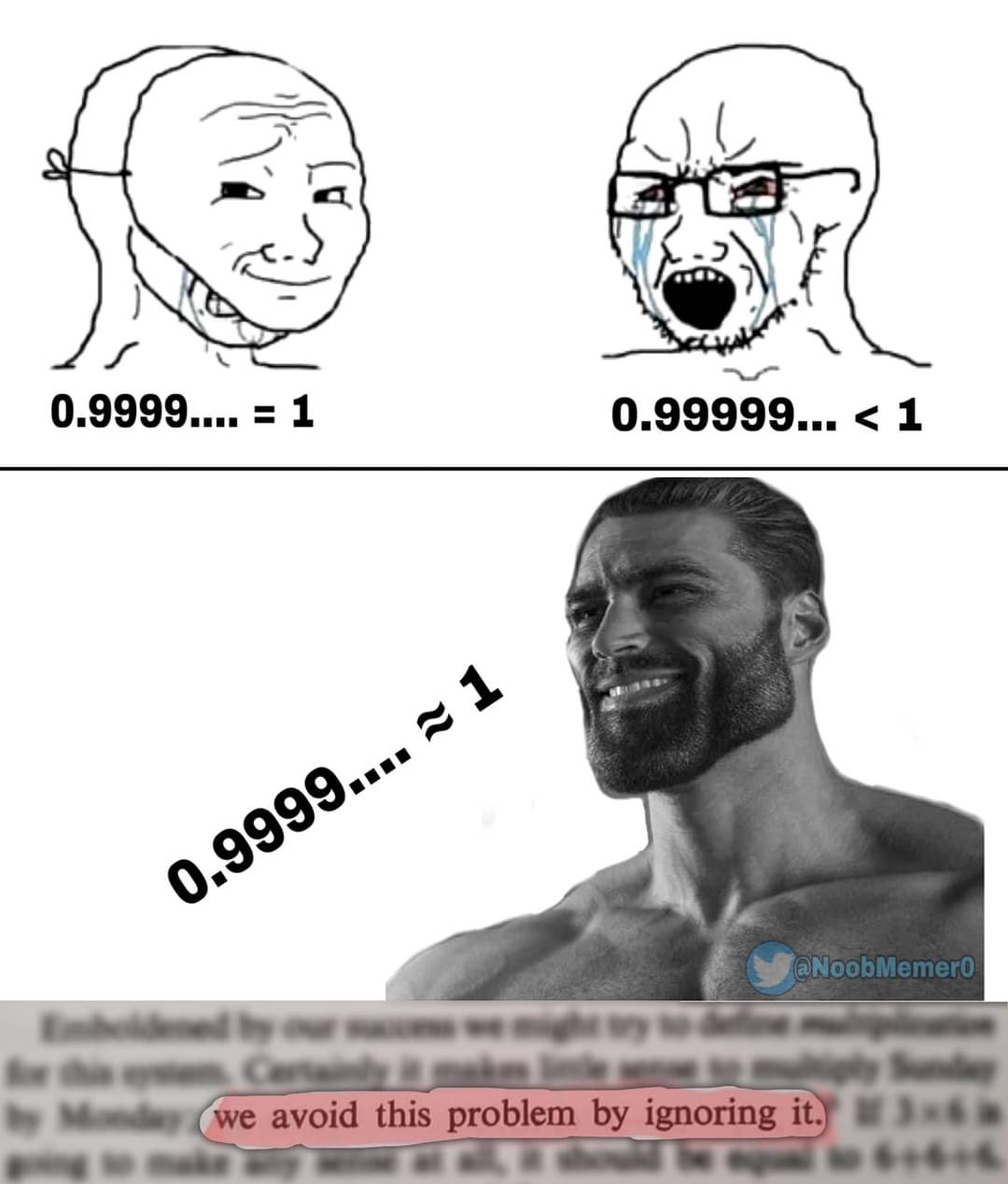this post was submitted on 27 Jun 2024
818 points (95.2% liked)
Science Memes
10923 readers
2491 users here now
Welcome to c/science_memes @ Mander.xyz!
A place for majestic STEMLORD peacocking, as well as memes about the realities of working in a lab.

Rules
- Don't throw mud. Behave like an intellectual and remember the human.
- Keep it rooted (on topic).
- No spam.
- Infographics welcome, get schooled.
This is a science community. We use the Dawkins definition of meme.
Research Committee
Other Mander Communities
Science and Research
Biology and Life Sciences
- [email protected]
- [email protected]
- [email protected]
- [email protected]
- [email protected]
- [email protected]
- [email protected]
- [email protected]
- [email protected]
- [email protected]
- [email protected]
- [email protected]
- [email protected]
- [email protected]
- [email protected]
- [email protected]
- [email protected]
- [email protected]
- [email protected]
- [email protected]
- [email protected]
- [email protected]
- [email protected]
- [email protected]
- !reptiles and [email protected]
Physical Sciences
- [email protected]
- [email protected]
- [email protected]
- [email protected]
- [email protected]
- [email protected]
- [email protected]
- [email protected]
- [email protected]
Humanities and Social Sciences
Practical and Applied Sciences
- !exercise-and [email protected]
- [email protected]
- !self [email protected]
- [email protected]
- [email protected]
- [email protected]
Memes
Miscellaneous
founded 2 years ago
MODERATORS
you are viewing a single comment's thread
view the rest of the comments
view the rest of the comments

I strongly agree with you, and while the people replying aren't wrong, they're arguing for something that I don't think you said.
1/3 ≈ 0.333... in the same way that approximating a circle with polygons of increasing side number has a limit of a circle, but will never yeild a circle with just geometry.
0.999... ≈ 1 in the same way that shuffling infinite people around an infinite hotel leaves infinite free rooms, but if you try to do the paperwork, no one will ever get anywhere.
Decimals require you to check the end of the number to see if you can round up, but there never will be an end. Thus we need higher mathematics to avoid the halting problem. People get taught how decimals work, find this bug, and then instead of being told how decimals are broken, get told how they're wrong for using the tools they've been taught.
If we just accept that decimals fail with infinite steps, the transition to new tools would be so much easier, and reflect the same transition into new tools in other sciences. Like Bohr's Atom, Newton's Gravity, Linnaean Taxonomy, or Comte's Positivism.
The character sequence "0.999..." is finite and you know you can round up because you've got those three dots at the end. I agree that decimals are a shit representation to formalise rational numbers in but it's not like using them causes infinite loops. Unless you insist on writing them, that is. You can compute with infinities just fine as long as you keep them symbolic.
That only breaks down with the reals where equality is fundamentally incomputable. Equality of the rationals and approximate equality of reals is perfectly computable though, the latter meaning that you can get equality to arbitrary, but not actually infinite, precision. You can specify a number of digits you want, you can say "don't take longer than ten seconds to compute", any kind of bound. Once the precision goes down to plank lengths I think any reasonable engineer would build a bridge with it.
...sometimes I do think that all those formalists with all those fancy rules about fancy limits are actually way more confused about infinity than freshman CS students.
Eh, if you need special rules for 0.999... because the special rules for all other repeating decimals failed, I think we should just accept that the system doesn't work here. We can keep using the workaround, but stop telling people they're wrong for using the system correctly.
The deeper understanding of numbers where 0.999... = 1 is obvious needs a foundation of much more advanced math than just decimals, at which point decimals stop being a system and are just a quirky representation.
Saying decimals are a perfect system is the issue I have here, and I don't think this will go away any time soon. Mathematicians like to speak in absolutely terms where everything is either perfect or discarded, yet decimals seem to be too simple and basal to get that treatment. No one seems to be willing to admit the limitations of the system.
The system works perfectly, it just looks wonky in base 10. In base 3 0.333... looks like 0.1, exactly 0.1
Oh the fundamental math works fine, it's the imperfect representation that is infinite decimals that is flawed. Every base has at least one.